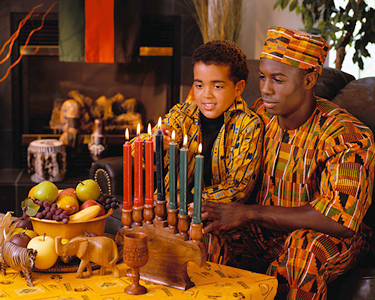Happy Kwanzaa!
Tuesday, December 29th, 2015December 29, 2015
Today, Tuesday, December 29, 2015, marks the fourth day in the 49th annual observation of Kwanzaa, a uniquely African American celebration. The celebration begins on December 26 and lasts for seven days. This year, millions of people in the United States will take part in Kwanzaa festivities and observe the seven principles upon which it is founded. As the fourth day of Kwanzaa, today is dedicated to Ujamaa (cooperative economics), and people are asked to support local small businesses in their community.

Kwanzaa is an African American holiday that begins on December 26 and lasts for seven days. The holiday centers on seven principles. Each evening, families exchange gifts, light one of the seven candles, and discuss the day’s principle. This child is shown lighting one of the seven candles. Credit: © Corbis
Kwanzaa centers on the Nguzo Saba, seven principles of black culture. On each day of the holiday, one of the principles is emphasized. Each evening, families light one of the seven candles in the kinara (a candleholder) and reflect on the day’s principle. The principles of Kwanzaa are Umoja (unity), Kujichagulia (self-determination), Ujima (collective work and responsibility), Ujamaa (cooperative economics), Nia (purpose), Kuumba (creativity), and Imani (faith).
Kwanzaa festivities usually end with a joyous feast called karamu. Among families, karamu usually involves traditional African American foods, ceremonies honoring ancestors, and reflection on the old year and commitments for the new. Many cities across the United States hold public Kwanzaa observances. These often include performances, music, and dancing. The traditional colors of Kwanzaa are red, black, and green. These three colors have long represented Africa and are found on the flags of many African countries. Green represents the fertile land of Africa. Black represents the people of Africa, and red represents the blood that has been shed in the struggle for freedom for African nations.
Kwanzaa was developed in 1966 in the United States by Maulana Karenga, a black cultural leader and professor of Pan-African studies at California State University in Long Beach. The 1960’s, at the height of the civil rights movement, were a time of social upheaval and change for many African Americans. Karenga wanted to create a celebration that would honor the values of African cultures and inspire African Americans to strive for progress. Karenga based this celebration on harvest festivals common in many African societies at this time of year that had existed for thousands of years. He called the celebration Kwanzaa, sometimes spelled Kwanza, based on the phrase matunda ya kwanza, which means first fruits in Swahili (also called Kiswahili). He chose to use Swahili terms for the celebration because this language is widely used by various peoples in East Africa.
Other World Book articles:


